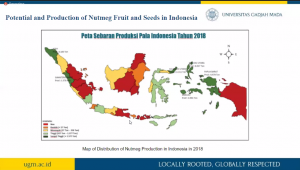
The webinar “The History, Utilization, Development, and Innovations of Indonesian Spices in the Food and Health Sector” was organized by the Center for Indonesian Culinary and Gastronomic Studies (PKKGI) UGM, the Faculty of Agricultural Technology UGM, and Kosmopolis Rempah UGM was held on Saturday, November 28, 2021, through the Zoom platform. The speakers of this webinar were Dr. Dwi Larasatie Nur Fibri, S.T.P., Ir. Gunawan Wibisono, Prof. Dr. Takuya Sugahara, Dr. Ir. Supriyadi, M.Sc., Prof. Dr. Edy Meiyanto, Apt.
Nutmeg (Myristica fragrans Houtt) is a spice plant native to Indonesia that was first discovered in the Banda Islands of Makulu Province, Eastern Indonesia. This plant is favored by domestic and foreign communities because of its high economic value and has been traded since ancient times until now. The economic value of nutmeg is highest in the seeds and mace.

Currently, Indonesia is the third largest producer of nutmeg after India and Guatemala. In 2017, nutmeg production reached 34,385 tons and total exports reached 55.7% of national production (36,242 tons). Considering the importance of economic value and high global demand for nutmeg, the Indonesian government through the Ministry of Agriculture is working on a nutmeg development program that is expected to increase nutmeg exports from Indonesia to 42,900 tonnes by 2021.
Apart from its role in economic value, nutmeg is also useful in the culinary world. Nutmeg seeds are commonly used in sweet and spice-rich foods, such as bakery products, basic seasonings (meat dishes, ready-to-eat seasonings, instant noodles), as well as beverage and dessert products. In addition, nutmeg pulp can also be made into pickled nutmeg, candied nutmeg, nutmeg jam, and others.
In the culinary world, nutmeg is useful for awakening the aroma and taste of food, supporting the presence of natural flavors in food, avoiding off-flavors and off-odors, and as a natural preservative for food ingredients. To process nutmeg into basic ingredients for dishes, it is necessary to pay attention to the quality of raw materials by the standards and ensure that the series of production processes comply with food safety requirements.
Nutmeg is also beneficial for health due to the presence of bioactive components. Bioactive components present in nutmeg include antibacterial, antioxidant, antifungal, and anti-inflammatory. Nutmeg is also used to make essential oils that are useful for perfume, cosmetics, soap, aromatherapy, chemoprevention, cleaning, flavoring, adhesive, medical, insect repellent, and dentistry. In addition, nutmeg can also be used as an anti-aging ingredient to inhibit premature aging.
Besides nutmeg, cumin seeds are also one of the most popular spices in the world. Cumin seeds have the potential as a functional food and anti-allergic ingredient. The antiallergic effect of cumin is obtained from the aqueous extract of cumin seeds, which is useful for curing pollinosis, food allergies, and atopic dermatitis.
